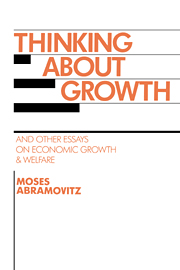1 - Thinking about growth
Published online by Cambridge University Press: 22 March 2010
Summary
Economic growth is one of the oldest subjects in economics and one of the youngest. It was a principal concern of the Wealth of Nations, and it filled the thoughts of economists for the next three quarters of a century. As the Victorian Age wore on, however, growth lost its hold on the attention and imagination of the great body of academic economists. It was left to Marx and his followers, whose premature obsession with the demise of capitalism appealed to neither the political tastes nor the scientific bent of the discipline's exponents. And then, after the Second World War, following a hundred years of comparative neglect, there was a resurgence of interest and study that has been proceeding with vigor for the last four decades.
In the new effort, much that had been known a century and more ago had to be relearned. The new effort has had the benefit, however, of far better and more extensive historical and statistical materials and a more sophisticated theoretical framework. The accomplishments of the new research, however, have been modest, which is testimony both to the complexity of the subject and to the limitations of economics and of the other social sciences as well. Yet the study of growth is going on energetically. It is interesting, therefore, to ask what the newer work has added to the older and where the subject now stands.
- Type
- Chapter
- Information
- Thinking about GrowthAnd Other Essays on Economic Growth and Welfare, pp. 3 - 79Publisher: Cambridge University PressPrint publication year: 1989
- 12
- Cited by



